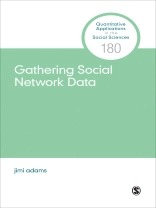Gathering Social Network Data provides an important complement to existing books that focus on social network analysis, and offers more detailed coverage than is available in existing chapter-length treatments. In a single centralized source, author jimi adams provides: (1) a broad overview of the unique set of general principles underlying network data collection, and (2) guidance on many particular details needed for the application of these principles to particular research questions. As well as chapters on data collection methods, the book includes a chapter on data quality, and another on ethical considerations.
Table des matières
Series Editor′s Introduction
Preface
About the Author
Acknowledgements
1. Why Relationships?
Description, Network Theories, & Theories of Networks
Types of Ties
Outline of the Rest of the Book
2. Sampling & Measuring Network Ties
Network Measurement
Sampling Designs
The ‘Boundary Specification Problem’
3. Modes of Network Data Collection
Active Research Participants
Passive Data Collection
‘Complex’ Network Data
4. Ethical Considerations
Voluntary Participation & Informed Consent
Balancing Risks and Benefits
Using & Presenting Network Data
5. Data Quality: Assessment, Implications, & Improvements
Missing Data
Data Reliability and Validity
6. The Way Forward
Appendix I: Terms & Resources
List of Abbreviations
Glossary
Recommended Additional Resources
Appendix II: Network Data Formats
Appendix III: Existing Data
Sample Instruments
Data Repositories
References
A propos de l’auteur
jimi adams is a Professor of Sociology at the University of South Carolina. He studies how networks constrain or promote the diffusion of information and/or diseases through populations. Much of this work has focused on HIV/AIDS and Covid-19 among populations in the US and Sub-Saharan Africa. Recently, his work has focused more on the integrative patterns and processes in problem-focused areas of science that draw from many academic disciplines (e.g., HIV/AIDS, demography, the environment). In addition, his work entails a focus on using social network theory to improve strategies used in the design and implementation of primary data collection projects. He received his Ph D in sociology from Ohio State University.












